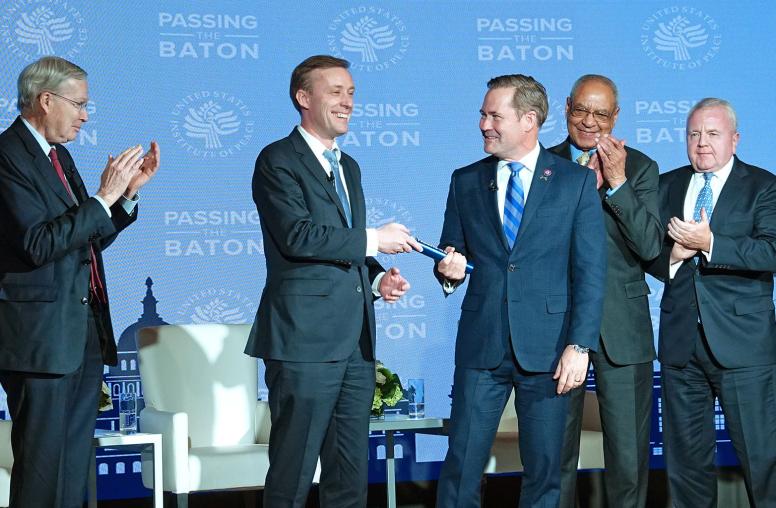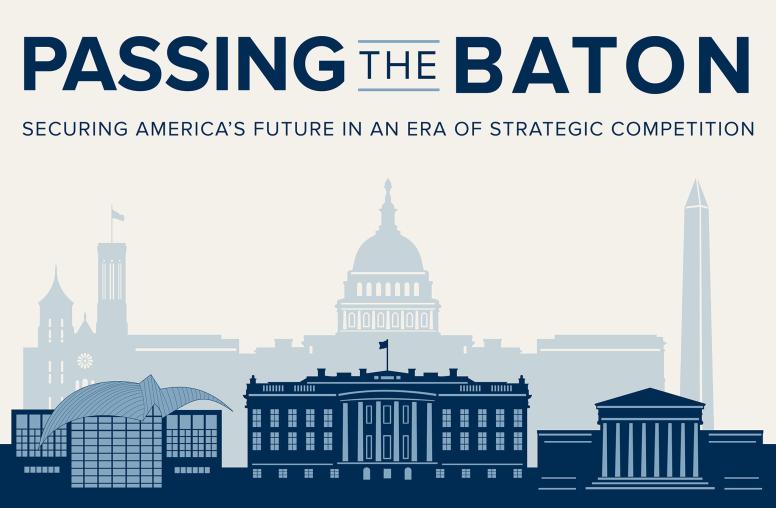Iraqi Prime Minister Abadi: Trump Is Supporting Us
Iraq’s Leader Says U.S. Help against ISIS Will Not Include ‘Large Numbers’ of U.S. Troops
Washington, D.C. – President Trump has assured Iraq’s government of greater U.S. support as it confronts ISIS and stabilizes the country, Iraqi Prime Minister Haider al-Abadi said today. “We have been given assurances that the support will not only continue but will accelerate,” al-Abadi said at the U.S. Institute of Peace immediately after meeting President Trump at the White House.
But U.S. support is unlikely to include the United States “sending troops in large numbers” to Iraq, Abadi said. “I think this administration wants to be head to head with terrorism, … to be more engaged.” But he said, “We are not talking about [U.S.] military confrontation as such” in Iraq.
Iraq’s forces “are at the last stage of liberating” the city of Mosul and its province from fighters of the Islamic State, or ISIS, said al-Abadi in a discussion with USIP President Nancy Lindborg, his only scheduled public appearance during his visit to Washington.
Al-Abadi will attend the March 22-23 conference hosted by the administration to frame strategy for the 68-member Global Coalition to Counter ISIS. “We need to have a plan together,” Abadi said, while acknowledging that conflicts in the Middle East complicate a unified effort. “We shouldn’t be derailing the whole thing” or losing focus against ISIS because of clashes among the region’s major actors, he said. A better regional approach against extremism is favored by last month’s visit of Saudi Arabia’s foreign minister—the first by a senior Saudi official since 1991, Abadi said. He said the visit by Saudi Foreign Minister Adel al-Jubeir has reduced Saudi worries that Iraq is under the influence of Iran, a Saudi rival. “Our Saudi friends used to think that Iraq is under the control of our Iranian neighbors,” Abadi said.
Abadi underscored the importance of work to stabilize regions of his country that are freed from ISIS control and that risk renewed communal or factional violence. Reconciliation to prevent those clashes is a focus of USIP’s work in Iraq since 2003.
Iraq’s Local Peace Accords
USIP trains and supports a network of Iraqi peace mediators who have settled violent communal feuds in Mahmoudiya, Tikrit and other locales. The USIP-led peace accord in Mahmoudiya permitted a drawdown there of more than 2,500 U.S. troops in 2007.
USIP and its Iraqi partners mediated a peace agreement at Tikrit, in 2015, that stabilized the city after ISIS fighters massacred 1,700 military cadets nearby, igniting a blood feud between Sunni and Shia tribes.
In January, USIP’s Iraqi partners mediated a reconciliation agreement to prevent tribal fighting at Hawija, in the troubled province of Kirkuk. Analysts say similar accords are critical to stabilize Mosul, a region that is one of Iraq’s most ethnically mixed.
“In the past two years, we have concentrated our local reconciliation efforts in Tikrit and Yathrib in Salahuddin [Province], Ramadi in Anbar, Hawija in Kirkuk, and Tal Afar and Bartella in Nineveh [Mosul’s province],” Lindborg said. “The efforts of very courageous Iraqi facilitators,” working with tribal leaders and government officials “can pay off” and “can be replicated,” she said.
USIP also conducts research and analysis on issues of Iraqi peace and stability, such as Iran’s efforts to influence post-ISIS Iraq. The institute works in Iraq from field offices in Baghdad and Erbil.
Created by Congress in 1984, the United States Institute of Peace works to prevent, mitigate, and resolve violent conflict around the world. USIP does this by engaging directly in conflict zones and by providing analysis, education, and resources to those working for peace and on the ground in the world’s most dangerous regions.



